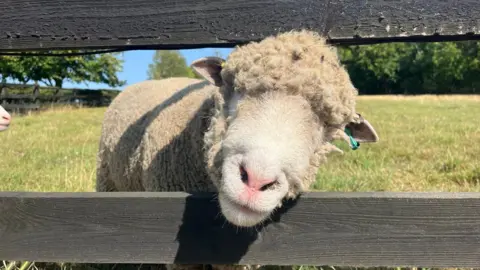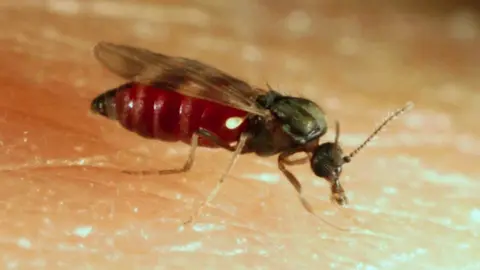Farmers face anxious wait over spike in bluetongue
 Nicola Haseler/BBC
Nicola Haseler/BBCA farmer has described how the health of his sheep was hinging on what way the wind blew amid an outbreak of bluetongue in Europe.
The virus, which is carried by midges, can cause infertility, lesions and lameness in cattle and sheep.
Robert Law, of Thrift Farm in Royston, Hertfordshire, said the effects could be "devastating".
"It only takes one day when the breeze is blowing in a certain direction that these midges can be blown over to Britain," he said.
There have been no cases recorded in England amid the outbreak, which originated in the Netherlands, although livestock farmers are being warned to be vigilant.
Free testing has been made available to those in the highest risk counties of Essex, Suffolk, Norfolk, Kent and East Sussex.
 Nicola Haseler/BBC
Nicola Haseler/BBC"We are just keeping our fingers crossed and looking at the weather forecast every night," Mr Law said.
The farmer explained how his business would be damaged if the 130 ewes he tended to were rendered infertile by bluetongue.
"That's very important because we're getting everything ready for next year's lambing," he added.
"It's a waiting game at the moment. Checking our sheep, looking at the weather forecast and listening to what's going on in Holland."
 The Pirbright Institute
The Pirbright InstituteCharles Hesketh, of the National Farmers' Union in the East of England, said infection rates in the Netherlands were increasing "at quite an exponential rate".
"The concerning thing is they’re not just positive cases through testing, they are actually seeing clinical signs," he said.
"They’re seeing animals, principally sheep, with lameness, respiratory issues or lesions on their face which can be quite severe."
Mr Hesketh added it would be unfortunate if the wind "blew the wrong way" and brought infected midges to England's east coast.
There is no vaccine that has been authorised to protect livestock from bluetongue.
"There’s not only the business impact in terms of losing animals, but there’s also the real impact on [farmers'] mental wellbeing as a result of seeing animals in distress," Mr Hesketh said.
Follow Beds, Herts and Bucks news on BBC Sounds, Facebook, Instagram and X.
